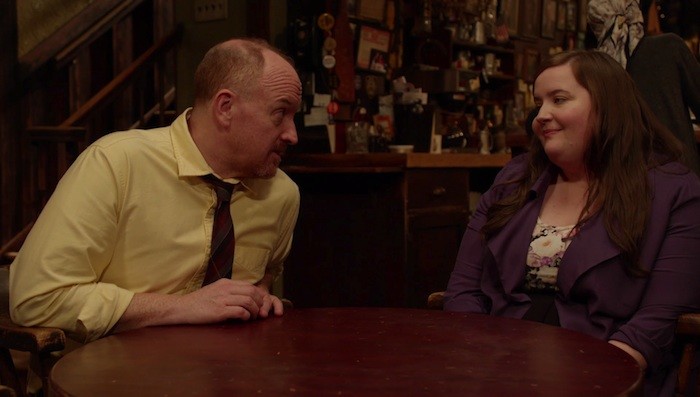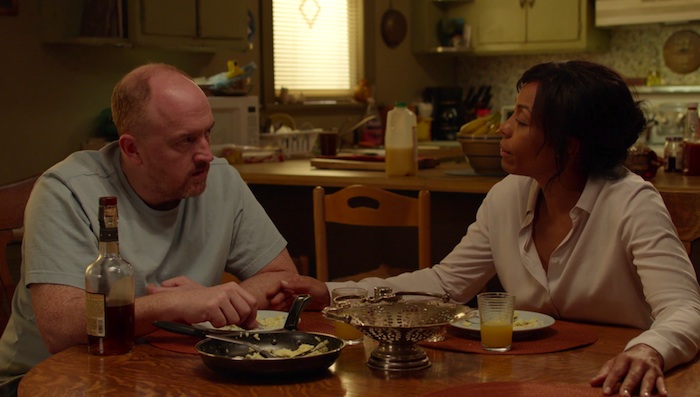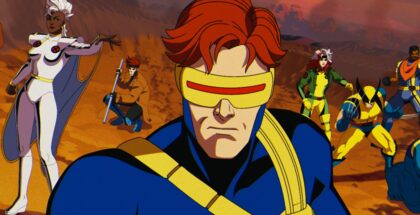Louis C.K.’s Horace and Pete review: Episode 7
Craig Skinner | On 19, Mar 2016
Warning: This contains spoilers. Not seen this episode yet? Catch up with our reviews of Horace and Pete so far here.
Following the events in last week’s episode of Horace and Pete, it was hard to imagine where C.K. could go with the next episode. Horace (Louis C.K.) and Sylvia (Edie Falco) had behaved so cruelly to Pete (Steve Buscemi) and everything was left in such an unpleasant, toxic fashion, how could everything just carry on as normal? What’s even more surprising than the fact that this is exactly what happens in Episode 7 is the fact that C.K. actually makes that work – the episode is even amusing and rather touching at times.
After the dinner from hell last week, the dysfunctional trio of Horace, Sylvia and Pete could easily have been in dark places this week, but C.K. smartly reflects the reality of uncomfortable, even horrid, family dinners; this week, no one mentions it and everyone acts like nothing happened. It’s business as usual at Horace and Pete’s.
And that’s the case with everything about this episode. Despite the impossibility of this actually being the case, given the limited number of episodes and differing approaches C.K. has taken, Episode 7 feels like a typical Horace and Pete episode. Events unfold at a relatively relaxed pace, characters drift in and out to say topical, awful, funny, awkward and emotionally heavy things and the episode ends on a difficult conversation about an important topic. This sense of familiarity is no bad thing when the writing continues to be great and the performances are of the highest calibre.
The episode opens with what may be Kurt’s (Kurt Metzger) best scene to date. After the subject of Sodom and Gomorrah comes up, he attempts to explain the story, as it appears in Genesis. He’s a little hazy on the details and there’s a definite undercurrent of homophobia to Kurt’s attitudes, but his attempt to simply lay out the story is incredibly funny, especially because of how shocked and amused the rest of the bar are. There are plenty of sections in the Bible, such as the story of Sodom and Gomorrah, that rarely get talked about in any detail and even many people, such as some of those in the bar, who consider themselves Christians can be surprised by the specifics of the stories.
This follows another amusing moment in which Kurt rants about a comedian who is telling people how to vote and comparing Trump to Hitler – exactly what Louis C.K. did in the email that accompanied the release of last week’s episode. The comedian’s name? K.C. Louisstein. Geddit?
C.K. has made a number of references to politics within Horace and Pete, both on the surface, with pointed dialogue, and in the subtext of the way in which characters behave and the bar’s allegorical nature, so it was interesting to see him make such a clear effort to state an opinion in the email rather than leave the show to do the talking. All of what he said is in the show, if you scratch the surface just a little.
Episode 7 climaxed with a lengthy conversation between Horace and a woman he picked up in the bar named Rhonda (Karen Pittman). The pair are having a somewhat awkward post-one-night-stand breakfast when Rhonda makes an off-hand joke about how she’s used to be a man. It’s still not clear at the end of the episode whether this is actually the case or she was using this joke, which Horace reacts badly to, to challenge him and make a point. But it doesn’t actually matter. That’s her point.
Horace makes it very clear that he strongly feels that equality is important and that trans women should have all the rights that all other women do, but when it comes to the question of whether Rhonda used to be a man or not, he feels like he has the right to know and that he sees men who sleep with trans women as somehow deviant.
Horace may have the right idea about acceptance and equality but the reality is a little more complex and too hard for him to deal with. Horace’s belief that if Rhonda used to be a woman, she should reveal this information also interestingly picks up on one particular strand from Episode 6: Horace was so sure that Pete should reveal information about his past that he felt the need to do it on his behalf. And to his credit he does at least practice what he preaches, no matter how misguided he might be, and is not backwards about letting Rhonda know about his problematic past – we also learn at this point that his son and daughter’s mother’s are his ex-wife and her sister – but he is adamant that a trans woman should reveal her past as a man.
It’s an incredibly tricky conversation, but it’s one that, for the most part, C.K. makes his way through incredibly well, delivering a point clearly and with nuance and intelligence. The only way in which he potentially falls foul, though, is in possibly coming across as lecturing the audience, as a cisgender male.
C.K. is, of course, not best placed to write about the subject and talk about these issues, but that doesn’t mean he should ignore them. His opinion on the matter is far from the most important, but that doesn’t mean it’s not worth hearing, and he makes it clear throughout the episode that you should feel free to ignore him.
In the opening rant from Kurt, C.K. seeds the idea that we shouldn’t be listening to a comedian on important matters and even more crucially he writes a very pointed exchange between Horace and his daughter in which Horace says that “not everyone is equal” when it comes to talking about issues. He jokes: “Why does a pumpkin have to pretend to be equal to a peanut?”
In this sequence, Horace is arguing that it’s okay for a father to be condescending to his daughter, but the point C.K. seems actually to be making and highlighting for the final scene is that some people have more authority to talk about a subject than others. Some may see that as C.K. talking about himself – it’s easy to conflate Horace with C.K., as they look so similar – but this seems more to be about undercutting his own show.
While he may be offering up a viewpoint about the acceptance or lack of true acceptance – life is more than just including a supportive hashtag – of trans women, he absolutely deserves to be condescended to by someone better equipped to talk about it. C.K. is casting himself as the peanut in Horace’s metaphor. And it’s fine that the peanut has something to say, and it’s worth listening to, but there are plenty of pumpkins out there that should feel free to condescend to him.
Rhonda leaves with Horace challenged and none the wiser about whether or not she used to be a man, but he still wants another date. He’s had his attitudes challenged and he’s left with something to think about, something that C.K. appears to be keen to do to his audiences too.
Rhonda is open about one thing as she leaves – that she’s a “drunk” – and there’s the definite sense that this one night stand could lead to something more significant between them. She makes this confession, it seems, so that Horace knows what he could be letting himself in for. Hopefully, this is the beginning of a more substantial relationship, if only because Pittman is great here and her character could be an excellent counterpoint to some of the others and their entrenched attitudes.
The final moments of the episode are between Horace and Sylvia, who has just found out that she is going to be okay, following her cancer treatments. The brother and sister share a tender hug, and Horace wells up. It’s sweet and incredibly affecting – and that is even more remarkable given their behaviour in the previous episode. C.K. has written rich characters and the result is that we can feel a number of deeply complex, and even conflicting, emotions about them at the same time. The awfulness on display in Episode 6 made it hard to imagine a future watching these characters for too much longer, but Episode 7 of Horace and Pete shows that C.K. has the skills necessary to keep us invested and highly engaged again and again with no end in sight.
Horace and Pete available to watch online on Amazon Prime Video as part of a Prime membership or a £5.99 monthly subscription. It is also available to stream and download from Louis CK’s website in up to 1080p in any country.





















